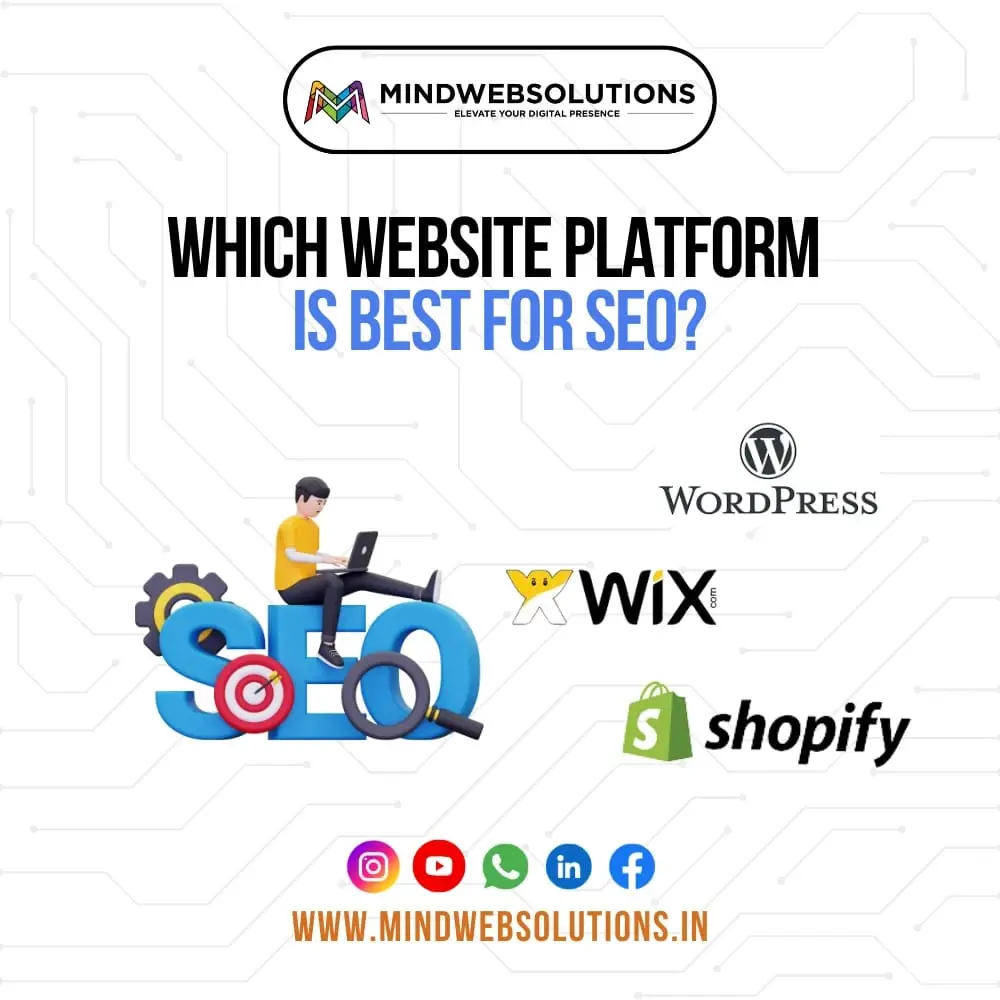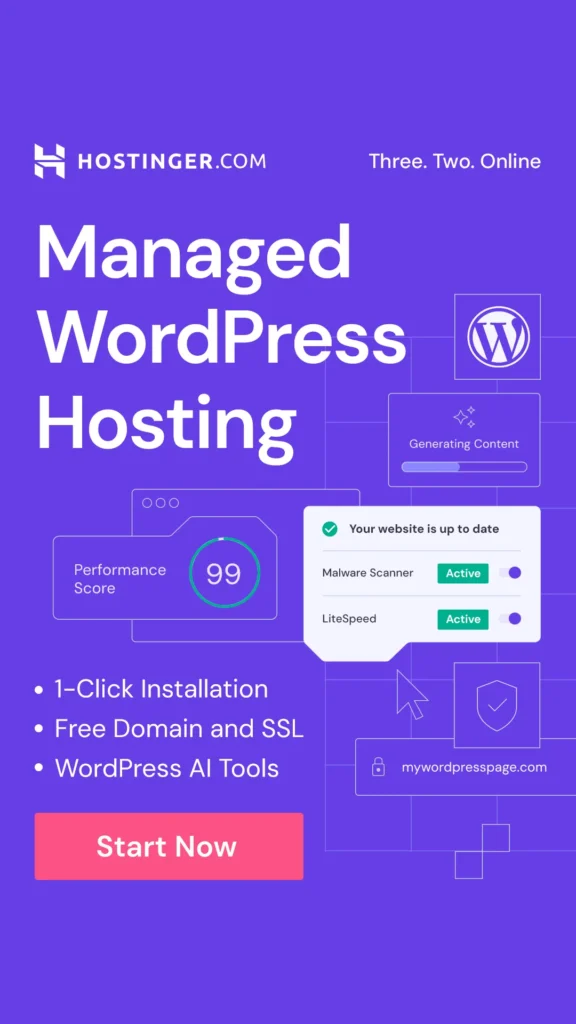Which Website Platform Is Best for SEO?
- WordPress
- Flexibility and customization: WordPress is the most popular platform, known for its extensive customization options. It offers thousands of plugins, including top SEO tools like Yoast SEO and All in One SEO, which allow for in-depth on-page optimization, including meta tags, sitemaps, and schema markup.
- Content management: As a content management system (CMS), WordPress is ideal for creating and managing large amounts of content, which is crucial for SEO.
The platform supports easy blog creation, content updates, and media management.
- Control over SEO: WordPress gives users full control over their SEO settings, from URL structure to image optimization.
It is highly customizable for both beginners and advanced users, making it a versatile choice for SEO.
- Wix
- Ease of use: Wix is a user-friendly platform with built-in SEO tools that are easy to use even for beginners.
It offers an SEO Wiz that guides users through basic SEO setup, including keyword suggestions and page optimization.
- SEO Limitations: Although Wix has improved its SEO capabilities over the years, it still has some limitations, especially in more advanced SEO features like custom URL structure and in-depth technical SEO options.
- Site Speed: One area where Wix sometimes falls short is site speed, which can impact SEO. However, Wix is constantly working on improving its performance to become more competitive.
- Shopify
- Ecommerce SEO: Shopify is designed specifically for ecommerce, making it a top choice for online stores.
It offers robust SEO tools optimized for product pages, including customizable title tags, meta descriptions, and alt text for images.
- Mobile Optimization: Shopify themes are mobile-responsive, which is essential for SEO, given Google’s mobile-first indexing.
The platform also seamlessly integrates with Google Shopping, making your products appear in search results.
- Limitations: Although Shopify is excellent for ecommerce, it may not offer the same level of flexibility and control over SEO as WordPress, especially for non-product pages.
- Squarespace
- Design and SEO balance: Squarespace is known for its beautiful, designer-friendly templates, but it also offers solid basic SEO tools.
Users can edit meta titles, descriptions, and URLs, and the platform automatically generates XML sitemaps.
- Content management: While not as powerful as WordPress, Squarespace’s content management features are suitable for small businesses and creatives who want a balance of aesthetics and SEO.
- SEO tools: Squarespace doesn’t have some advanced SEO features, such as the ability to add structured data or customize robots.txt files, which could be a limitation for more complex SEO needs.
What Is The Importance of Platform Features for SEO?
- Ease of Customization
- Meta Tags and URLs: The ability to easily customize meta titles, descriptions, and URLs is crucial for SEO. These elements help search engines understand your content and improve your click-through rates (CTR) from search results.
- Header Tags: A platform that allows you to customize header tags (H1, H2, H3, etc.) and structure your content effectively is crucial. Proper use of header tags helps search engines interpret your content hierarchy and relevance.
- Customizable Themes and Templates: This flexibility allows you to customize design elements, load speed, and user experience, which are all important SEO factors.
- Mobile-Friendliness
- Responsive Design: With Google’s mobile-first indexing, having a mobile-responsive design is imperative. A platform that automatically optimizes your site for mobile devices ensures that your site performs well on all screen sizes, improving user experience and SEO rankings.
- Page load speed: Platforms that support fast-loading themes and provide tools for optimizing images and other elements are essential for maintaining strong SEO performance.
- Plugin and extension support
- SEO plugins: Platforms like WordPress excel at SEO due to their extensive plugin ecosystem. SEO plugins like Yoast SEO or All in One SEO offer advanced features for on-page optimization, sitemaps, and more, making it easier to manage SEO tasks.
- Analytics and tracking tools: Integrating analytics tools like Google Analytics is crucial for tracking your site’s SEO performance. Platforms that support these integrations allow you to monitor key metrics like traffic, bounce rates, and conversions, allowing you to adjust your SEO strategy as needed.
- Security plugins: Security is an often overlooked aspect of SEO. Platforms that support security plugins help protect your site from attacks and malware, which can negatively impact your rankings if left unchecked.
- Content management system (CMS)
- Content creation and management: SEO-friendly platforms should make it easy to create, edit, and manage content. Updating content regularly is a key SEO strategy, and a good CMS simplifies this process.
- Media optimization: The ability to easily optimize images, videos, and other media is a must. This includes features like alt text customization, lazy loading, and automated image compression, which help improve load times and accessibility.
- Internal linking structure: Platforms that allow for easy internal linking help improve your site’s navigation and distribute link equity effectively. This enhances the user experience and helps search engines crawl your site more efficiently.
- Built-in SEO tools and features
- XML sitemaps: Platforms that automatically generate and update XML sitemaps help search engines index your site more efficiently. This ensures that all your important pages can be found and ranked.
- Canonical tags: The ability to add canonical tags is important to avoid duplicate content issues. SEO-friendly platforms should make it easy to set these tags so search engines know which version of a page to index.

What Is the Fastest Website Platform for SEO
Website speed is a key factor in SEO, affecting user experience and search engine rankings.
- The Importance of Website Speed in SEO Rankings
- Google’s Emphasis on Speed: Google considers page speed as a ranking factor, especially with the introduction of Core Web Vitals, which measures user experience in terms of loading performance, interactivity, and visual stability. Faster websites rank higher because they provide a better user experience.
- Bounce Rates and User Engagement: Slow-loading websites leads to higher bounce rates, as users are more likely to abandon a site that takes too long to load. This negatively impacts user engagement metrics like time on page and session duration, which are also considered in SEO.
- Mobile-First Indexing: With the shift to mobile-first indexing, website speed on mobile devices has become even more important. A platform that optimizes speed across all devices is essential to maintaining strong SEO performance.
- How different platforms manage speed optimization
WordPress
- Caching plugins: WordPress supports a number of caching plugins, such as WP Super Cache and W3 Total Cache, which significantly reduce page loading times by storing a static version of your site.
- Image optimization: Plugins such as Smush and ShortPixel automatically compress and optimize images, further improving speed.
- Lightweight themes: WordPress offers a range of lightweight, fast-loading themes designed for speed optimization, such as Astra or GeneratePress.
Wix
- Built-in speed optimization: Wix automatically optimizes website speed by compressing images and serving them in WebP format, reducing the number of HTTP requests, and using a global content delivery network (CDN).
- Mobile optimization: Wix’s mobile editor ensures that sites are optimized for mobile devices, although this platform may have limitations in achieving the highest speeds compared to others.
Shopify
- Server and CDN usage: Shopify hosts all of its sites on high-speed servers with a built-in CDN, ensuring fast load times globally.
- App optimization: While Shopify apps can add functionality, they can also slow down your site. Shopify allows some customization and app optimization to maintain speed.
- Image compression: Shopify automatically compresses images, but you can also use additional apps to further optimize image sizes.
Frequently Asked Questions About 'Which Website Platform Is Best for SEO?'
WordPress is often considered the best for SEO because of its flexibility and the availability of powerful SEO plugins. It allows for deep customization and is suitable for a wide variety of websites, from blogs to e-commerce.
Shopify and WordPress are among the fastest platforms for SEO, thanks to their built-in speed optimizations, CDN usage, and extensive caching options. They ensure quick loading times, which is crucial for SEO rankings.







